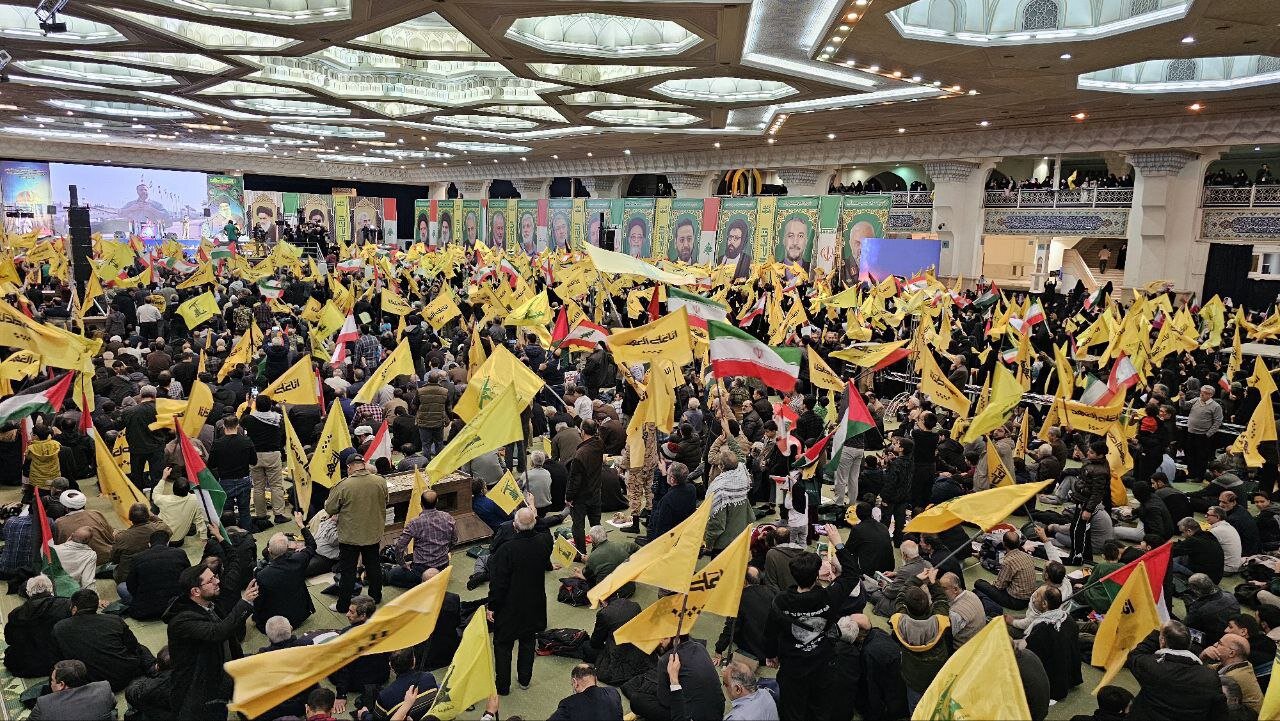Memorials across Iran mark the legacy of Hezbollah’s martyred leaders

TEHRAN – Iran held nationwide ceremonies on Sunday to honor Hezbollah leaders Sayyed Hassan Nasrallah and Sayyed Hashem Safieddine. Coinciding with the funeral in Beirut, these events were marked by passionate support for the Resistance movement and fervent chants against the Israeli regime and the United States.
One notable gathering took place at the Imam Khomeini Prayer Hall in Tehran, where a large crowd assembled after the Maghrib and Isha prayers. The atmosphere was charged with emotion as participants, including seminarians, students, families of martyrs, national and military officials, and foreign dignitaries, engaged in Quran recitations, eulogies, and revolutionary songs.
Chants of "Death to Israel," "Death to America," and "Labayk ya Nasrallah" (At your service, O Nasrallah) resonated throughout the hall, reflecting the deep-seated anti-imperialist sentiment and unwavering commitment to the cause of Resistance.
Similar ceremonies were conducted in holy shrines, blessed sites, prayer halls, and central mosques across the country.
Many Iranians had hoped to attend the funeral in Beirut but were prevented from doing so due to travel restrictions. Instead, they turned to live streams and local events to pay their respects.
Voices of the people: commitment to Resistance
Kamal, a 43-year-old construction worker from Tehran, shared his experience: "I really wanted to be there in Beirut to honor these great men who sacrificed everything for the Resistance," he said. "But since I couldn't, I watched the livestream all day. When those Zionist fighter planes broke the sound barrier over Beirut, it was a vile act that made me angry; that fury only made me more determined to support the Resistance."
The ceremonies also served as a reminder of the strong bond between Iran and Hezbollah. Martyr Nasrallah, who had led Hezbollah since 1992, was widely regarded as a symbol of resistance against Israeli occupation and Western imperialism. His deputy, Sayyed Hashem Safieddine, was seen as a key figure in the organization's leadership structure, even though he was lesser known.
Hajj Saeed, a 72-year-old retiree, praised Nasrallah’s enduring legacy: "He was not just a leader for Hezbollah; he was a beacon for all of us who believe in standing up against oppression. His speeches ignited a fire in the hearts of millions. His legacy will live on, and we must ensure that his sacrifices are not in vain."
Younger generations also voiced their dedication to continuing the struggle. Roxana, a 17-year-old student from Rasht, emphasized the role of women in the Resistance: "As young women, we have a responsibility to uphold the values he stood for. Even though we are not at the forefront of the fight, our daily behaviors are statements of identity and resistance against Western cultural aggression. We will walk the path of resilience and faith that Sayyed Nasrallah exemplified."
Alireza, a 65-year-old veteran of the 1980s imposed Iran-Iraq war, highlighted the broader impact of Nasrallah's leadership: "Martyr Nasrallah was a visionary who united different factions under the banner of Resistance. The enemy thought that by eliminating him, they could weaken us, but they are mistaken. His ideas and spirit live on in all of us. We will continue to fight until victory."

Leave a Comment